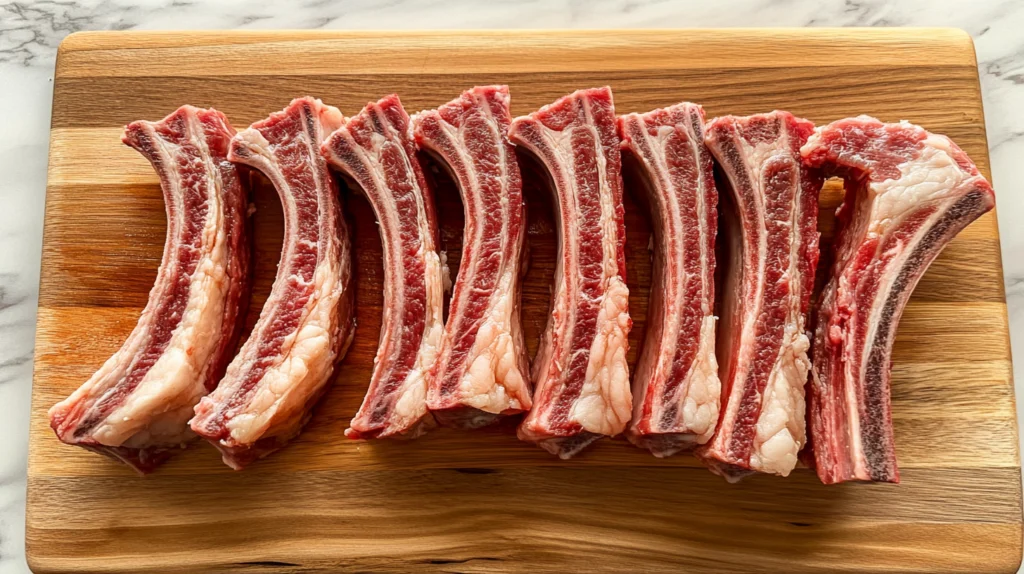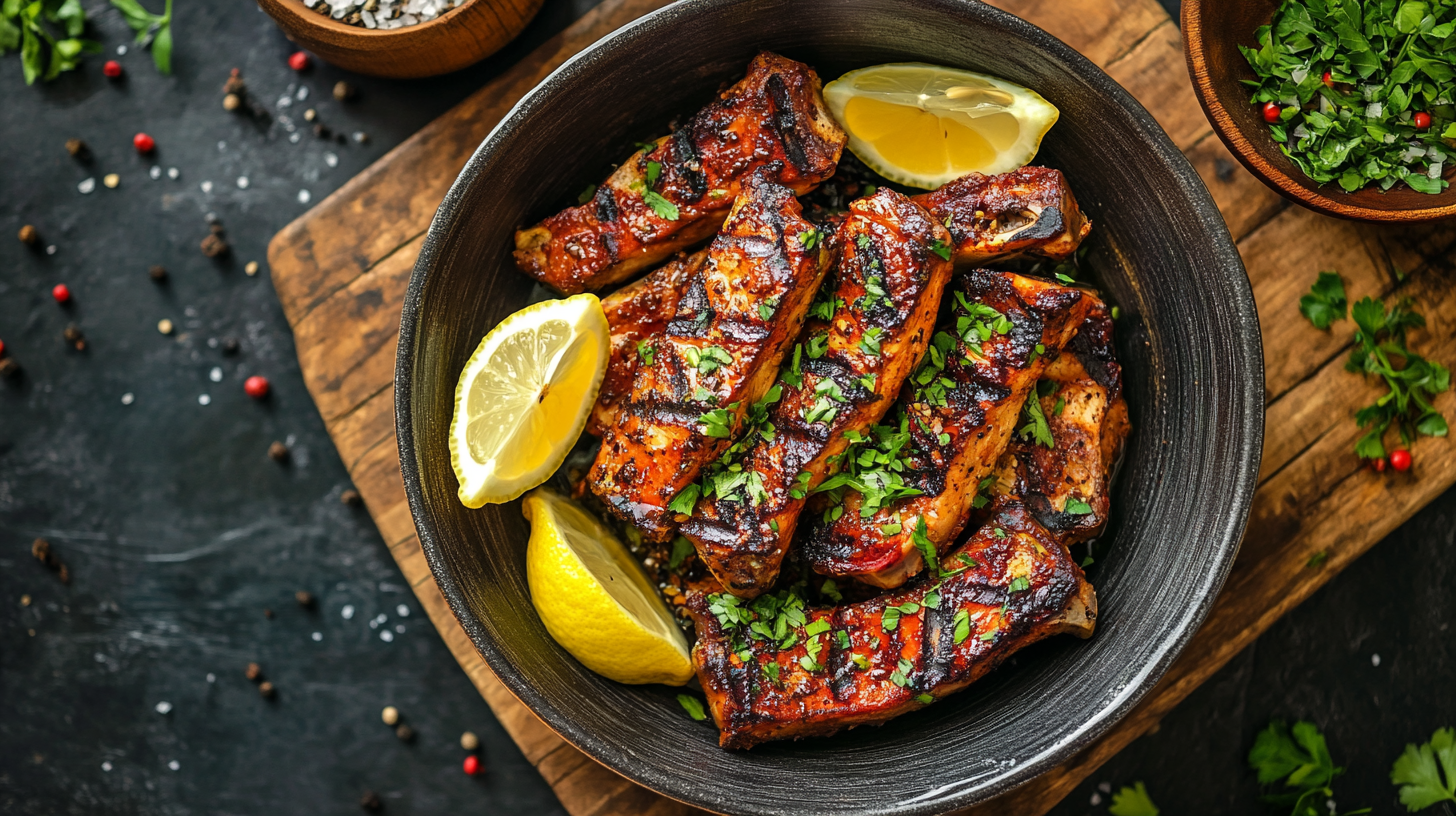Learn how to marinate mutton chops? Discover simple steps, flavor tips, and expert advice to create tender, juicy, and delicious results every time.
Grasping how to marinate mutton chops? transforms tough cuts into tender, flavorful bites. Because mutton comes from mature sheep, it has a rich flavor that rewards careful marination. Indeed, marinating adds complexity, tenderness, and moisture. Eventually, you gain confidence experimenting with different ingredients and methods. Furthermore, mastering marination techniques helps you create memorable meals that impress family and friends.
Understanding Mutton Chops and Their Characteristics
Mutton differs from lamb because it comes from older sheep, usually over one year old. Consequently, the meat develops a more pronounced flavor and firmer texture. Mutton’s depth of flavor calls for methods that soften and complement its natural taste. Therefore, marination plays a crucial role in breaking down tougher fibers.
In addition, mutton chops often contain more connective tissue and fat than younger lamb cuts. However, this extra richness can lead to succulent results if handled properly. Thus, a well-chosen marinade can balance the meat’s intensity and ensure that every bite feels pleasantly tender and juicy.
The Science Behind Marinating Mutton Chops
When you learn how to marinate mutton chops?, you harness chemistry. Acids from citrus or vinegar help break down proteins, making the meat more tender. Salt encourages muscle fibers to absorb moisture, enhancing juiciness. Oils carry flavors and prevent dryness, while spices and aromatics infuse their essence deep within the chop.
Eventually, a well-crafted marinade transforms a simple chop into a gourmet treat. However, over-marinating leads to mushy textures or an overly sharp taste. Therefore, finding the right balance of time and ingredients is key. Experiment with different combinations, noting that a great marinade respects the meat’s character while adding layers of complexity.
Key Ingredients for Successful Marination
Choosing the right ingredients determines how your final dish tastes. For acidity, consider lemon juice, lime juice, or plain yogurt. Because yogurt contains enzymes, it tenderizes without making the meat stringy. Likewise, vinegars like apple cider or red wine vinegar impart subtle tanginess.
Moreover, oils like olive or neutral vegetable oil help distribute flavors evenly and prevent the meat from drying out. Add herbs and spices for depth. For example, rosemary, thyme, cumin, paprika, or chili flakes enhance savory profiles. Sweeteners like honey, agave, or brown sugar introduce caramelization and soften sharper flavors. Altogether, these elements work in harmony, building a balanced marinade that improves taste and texture.
Essential Tools and Equipment
While mastering how to marinate mutton chops?, invest in the right tools. Store your marinating meat in non-reactive containers such as glass, ceramic, or food-grade plastic. Avoid aluminum or cast iron, as they may react with acidic ingredients. Additionally, use measuring spoons and kitchen scales to maintain consistent ratios.
Keep the meat refrigerated during the marination process. Ensure that the container is well-sealed to prevent cross-contamination and odors from other foods. Furthermore, when you remove the chops from their marinade, pat them dry gently before cooking. Excess liquid can prevent proper browning and searing, so this step ensures a delicious crust.
How to Marinate Mutton Chops? Step-by-Step
Initially, start by trimming excess fat and connective tissue from the mutton chops. Pat them dry so the marinade adheres well. Next, combine your chosen acidic ingredient, oil, spices, and herbs in a bowl. Whisk them until they form a smooth mixture. Then, place the chops in the marinade, turning them to ensure even coverage.
Seal the container and refrigerate for the desired time. Short marination might take 30 minutes to an hour, while overnight marination intensifies the flavor. However, avoid exceeding recommended times, as the meat can become overly soft or too tangy. Finally, remove the chops from the marinade, let them reach near room temperature, and cook them using your preferred method. The result is aromatic and succulent.
How to Marinate Mutton Chops? for Middle Eastern Flavors
To create a Middle Eastern-inspired marinade, mix yogurt, lemon juice, garlic, cumin, coriander, and a pinch of cinnamon. Because yogurt tenderizes gently, it preserves texture while infusing the chops with a subtle tang. Let the mixture rest for at least four hours, ideally overnight, so flavors merge thoroughly. When grilled or broiled, these chops develop a fragrant crust with earthy, warm spices.
Serve these Middle Eastern marinated chops with pita bread, tabbouleh, or a simple cucumber-tomato salad. A drizzle of tahini sauce or mint yogurt dip adds extra brightness. Eventually, you’ll achieve a dish reminiscent of bustling bazaars and sun-soaked coasts.
How to Marinate Mutton Chops? for Mediterranean Style
For a Mediterranean marinade, combine olive oil, garlic, rosemary, thyme, oregano, lemon zest, and a splash of white wine. Equally, consider adding cracked black pepper and a pinch of salt. This combination evokes sunny olive groves and coastal breezes.
Marinate the chops for at least two to four hours. Consequently, they absorb fresh herbal notes and citrusy brightness. Grill them until they develop a light char and serve with grilled zucchini, olives, and a sprinkle of feta cheese. The resulting meal feels vibrant and refreshing, perfect for warm-weather gatherings.
How to Marinate Mutton Chops? for Spicy and Tangy Variations
If you crave bolder flavors, craft a marinade with chili paste, ginger, soy sauce, vinegar, honey, and a dash of smoky paprika. This blend balances heat, tang, and sweetness. Because soy sauce adds umami, the final dish tastes rich and savory.
Marinate for about two to three hours, adjusting chili quantity for desired spice levels. Afterward, grill or roast the chops until they form a caramelized crust. Serve with jasmine rice, pickled vegetables, or a simple cucumber salad. This approach caters to adventurous palates who enjoy layers of complexity and a lingering kick.
Tips for Adjusting Marinades to Personal Taste
If you prefer sharper flavors, increase acidity with extra lemon juice or vinegar. For sweeter results, add a bit more honey or brown sugar. If you want milder spice, reduce chili flakes or add a dollop of yogurt. Eventually, tasting as you go builds intuition.
Because marination is flexible, do not fear experimenting. Try substituting herbs or discovering new spice blends. Fresh mint, basil, or cilantro can replace rosemary or thyme for different flavor profiles. Over time, you’ll develop a signature marinade that reflects your personality and culinary curiosity.
Marinating Times and Safety Considerations
Short marinations, around 30 minutes, impart light flavor layers. Longer marinations, up to 8-12 hours, deepen tastes and improve tenderness. Nevertheless, marinating for more than 24 hours can affect texture negatively. The acid may break down muscle fibers too much.
Always keep marinating meat in the fridge to slow bacterial growth. Never leave it at room temperature for extended periods. After discarding the marinade, wash your hands and utensils thoroughly. If you plan to use leftover marinade as a sauce, boil it first to kill any pathogens. These safety measures ensure a pleasant, worry-free meal.

Cooking Methods After Marination
Once you’ve mastered how to marinate mutton chops?, apply various cooking methods. Grilling adds smoky char and caramelization. Broiling under high heat creates crisp edges and succulent centers. Pan-searing in a hot skillet develops a brown crust while roasting in the oven provides even cooking.
Before cooking, let the marinated chops stand at room temperature for about 20 minutes. This step ensures even heat distribution. Pat dry excess marinade to encourage browning. Cook to an internal temperature of about 140-145°F for medium doneness, adjusting based on personal preference. Resting the cooked chops for five minutes before serving redistributes juices, maximizing tenderness.
Serving Suggestions and Complementary Side Dishes
Pair marinated mutton chops with sides that enhance their flavor. Light salads, roasted vegetables, or grilled asparagus complement bold marinades. Flatbreads or aromatic rice soak up juices. Yogurt-based dips, tangy chutneys, or chimichurri-like sauces add brightness.
Consider couscous, hummus, or baba ganoush for a Middle Eastern marinade. For Mediterranean styles, try lemony potatoes, Greek salads, or a drizzle of olive oil over fresh arugula. Spicy and tangy chops pair well with cooling slaws, creamy coconut rice, or lightly sweetened mango salsa. These thoughtful pairings create balanced meals that highlight the complexity of marinated meat.
Cultural and Historical Insights
Marination has ancient roots. Historically, people marinated meats to preserve them before refrigeration existed. They discovered that acidic and salty liquids enhanced taste and texture. Over time, cultures worldwide developed distinct marinade traditions, blending local spices, herbs, and aromatics.
Trade routes and exploration introduced new flavors. Mediterranean marinades feature olive oil and herbs, reflecting the region’s agriculture and climate. Middle Eastern marinades highlight yogurt and warm spices, mirroring centuries of culinary exchange. Learning how to marinate mutton chops? connects you to global gastronomy, revealing layers of history in every bite.
Troubleshooting Common Marination Problems
If your marinated chops taste too salty, rinse them briefly or serve with unsalted sides to balance flavor. Overly sour results may improve by adding a touch of sweetness or pairing with creamy dips. If the chops become mushy, shorten the marinating time next attempt, reducing the acid level.
Blandness suggests the need for stronger flavors or a longer marination. Next time, increase spice quantities or choose bolder ingredients. Adapting each batch based on previous outcomes refines your skills. With practice, you’ll confidently solve issues and produce consistently delicious results.
Conclusion
Mastering how to marinate mutton chops? empowers you to create meals that captivate the palate. By understanding the science behind marination, choosing balanced ingredients, and following proper safety guidelines, you transform this robust meat into a tender, flavorful feast.
Experimentation leads to signature marinades that reflect your culinary personality. With each attempt, you refine your approach, discovering new taste combinations. Whether you prefer Middle Eastern warmth, Mediterranean freshness, or spicy tanginess, marinated mutton chops promise an unforgettable dining experience. Embrace the art of marination, and watch as your cooking evolves, impressing everyone at your table.
FAQs
How to grill mutton chops?
To grill mutton chops, first marinate them with your preferred seasonings. Afterward, preheat the grill to medium-high heat. Pat the chops dry before placing them over direct heat for a quick sear. Flip once browned, then move to indirect heat to finish cooking. Aim for an internal temperature of about 140-145°F for medium doneness. Finally, let the chops rest for a few minutes before serving. When prepared this way, grilled mutton chops gain a smoky, caramelized exterior and tender interior.
When were mutton chops popular?
Mutton chops, both as a dish and as a style of facial hair, have historical significance. Culinary-wise, mutton has been enjoyed for centuries in regions worldwide. In terms of facial hair, the “mutton chop” style gained popularity in the 19th century. As a meat, mutton chops consistently appeared in traditional cuisines. Although lamb often overshadowed mutton in some places, the renewed interest in global flavors has brought mutton back into culinary conversations. Today, marinated and grilled mutton chops offer a culinary window into rich, time-honored traditions.
Suggested Internal Links:
